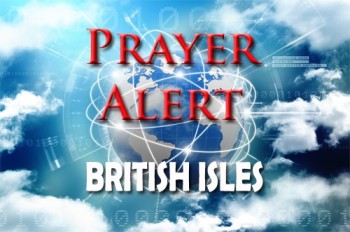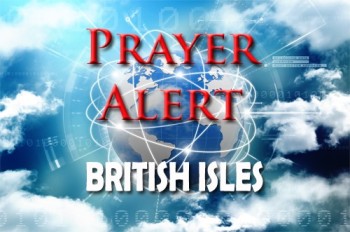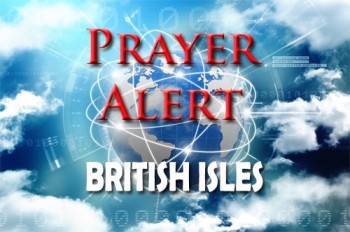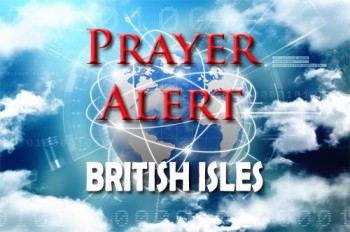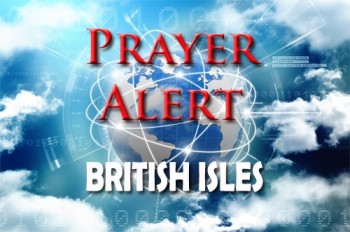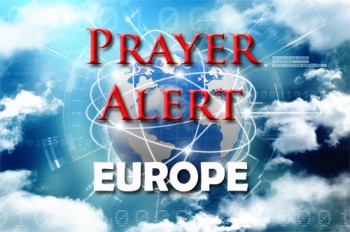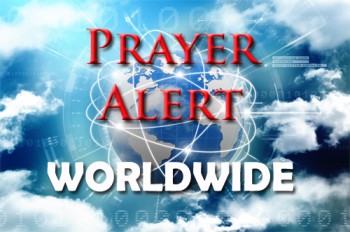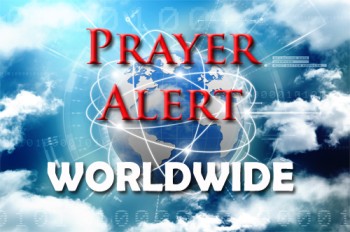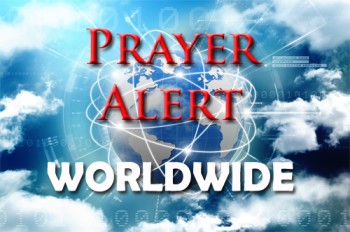
David Fletcher
David Fletcher is Prayer Alert’s Editor.
He is part of a voluntary team who research, proof-read and publish Prayer Alert each week.
If you would like to make a donation towards our running costs, please click here.
A predator who groomed an under-age girl online and tried to murder her in the street has been jailed for 43 years. Ellis Dismore, 24, had sent threatening and disturbing voice messages to members of his victim's family before he repeatedly stabbed her, police said. The knife attack in broad daylight in Middlesbrough in June 2023 was captured on a passing motorist's dashcam, and the teenager was saved when members of the public stepped in to help. Dismore was found guilty of attempted murder and more than twenty other offences against young girls including stalking and making indecent photographs of a child. After he sent her relatives a series of chilling messages, the police were told about what was happening. A CPS spokesperson said: 'Ellis Dismore is a dangerous and violent sexual predator who manipulated his young victims into sexual activity through fear and intimidation. We sincerely hope that the part they have each played in jailing such a dangerous man will bring them some measure of comfort.'
Northern Ireland’s economy minister, Conor Murphy, has warned that the UK’s new Electronic Travel Authorisation (ETA) scheme could severely impact tourism. Starting this week, visitors from 48 additional countries must apply for an ETA, costing £10 per person, before entering the UK. The digital permit, linked to passports, is valid for two years and allows multiple stays of up to six months. Murphy is lobbying Westminster to exempt Northern Ireland from the scheme, emphasising that 70% of international tourists arrive via the Republic of Ireland and could be discouraged by this added cost and process. He suggested a seven-day exemption for short-term visitors, highlighting tourism’s significant contribution to the Northern Ireland economy in 2023 and its importance as a peace process success story. Tour operators and tourism bodies voiced concerns that the added expense could deter visitors from visiting iconic destinations like the Giant’s Causeway. The Government, defending the ETA as a streamlined, secure system, has pledged to work with the tourism industry to address concerns.
The proposed Children’s Welfare and Schools Bill raises serious concerns for Christian parents and home educators in the UK. Critics, such as Steve Beegoo of Christian Concern, argue that the bill threatens parental freedoms, increases state overreach, and places undue suspicion on home-educating families. The bill includes measures like assigning unique identifiers to children, maintaining local registers, and requiring detailed reports of educational arrangements, including religious instruction. Critics worry this data could be misused or disproportionately target Christian families. Parents could face inspections to justify their educational choices, with penalties for non-compliance, such as fines or imprisonment. Local authorities might prevent parents from withdrawing children from schools, presuming guilt without evidence. This is particularly concerning for parents opposing ideologies, such as transgenderism, which conflict with their beliefs. Christian Concern highlights the rushed nature of the bill, calling it a significant intrusion into family life. It urges prayer, advocacy, and action to protect parental rights and ensure children are raised in environments aligned with biblical values.
Several NHS trusts in England have declared critical incidents amid a significant rise in flu cases. Hospitals are facing 'exceptionally high' demand, particularly in emergency departments, driven by a surge in respiratory illnesses. NHS data shows that the number of patients hospitalised with flu in England has quadrupled over the past month, exacerbated by cold weather. The Royal Liverpool University Hospital, the largest in Merseyside and Cheshire, stated that while it has a comprehensive plan to address the challenges, some patients will experience delays as priority is given to the most critical cases. It is working with partner organisations to discharge medically fit patients promptly to free up space. Non-emergency patients are being urged to use alternative services like GPs, pharmacies, walk-in centres, or the NHS 111 helpline.
The Church of England enters uncertain times as Justin Welby steps down amidst controversy over handling abuse cases. Welby resigned in November after an inquiry found he failed to address abuses by John Smyth, a former volunteer at Christian summer camps. Welby accepted 'personal and institutional responsibility' for the failures. Archbishop of York Stephen Cottrell will act as interim leader until a permanent successor is appointed, a process that could take six months. However, Cottrell faces scrutiny over his handling of a case involving priest David Tudor, whom he allowed to continue serving despite restrictions. Tudor was later banned for life, and Cottrell has apologised for delayed action. The Church is also grappling with broader challenges, including declining Christian identification in Britain and internal divisions over its stance on same-sex couples. Experts warn that the absence of stable leadership may further jeopardise governance and safeguarding efforts within the Church.
Donald Trump has expressed sympathy for Russia’s opposition to Ukraine joining NATO, suggesting such membership provokes Moscow and risks escalating conflict. Trump criticised the Biden administration’s support for Ukraine’s NATO ambitions, stating that Russia has long opposed NATO’s presence near its borders. Meanwhile, the Biden administration is preparing a significant final weapons package for Ukraine before the transition of power. While details remain unclear, it follows earlier military aid, with most promised equipment already delivered. Ukraine’s foreign minister announced the rescheduling of a meeting with Trump’s special envoy, emphasising the need for a meaningful dialogue. On the battlefield, tensions have escalated. Ukraine reported 94 clashes in Russia’s Kursk region, double the prior day’s count, and announced a new offensive. Fighting persists in Kurakhove, where Russia claims control, but Ukrainian forces dispute this, accusing Russia of using scorched-earth tactics. Both nations report heavy losses, but independent verification remains elusive.
Jean-Marie Le Pen, founder of France’s far-right National Front (FN), has died at 96, leaving behind a divisive legacy. Known for incendiary rhetoric, he propelled anti-immigration nationalism into mainstream French politics. His controversies included dismissing Nazi gas chambers as a ‘detail’ of history and multiple convictions for inciting racial hatred. Although he never held major office, his influence reshaped French political discourse, making immigration central to national debates. His death comes as his daughter, Marine Le Pen, builds momentum toward possibly becoming France’s next president. Since expelling her father from the party in 2015, she has worked to rebrand FN (now the National Rally) by moderating policies and rhetoric. Abandoning her father’s hardline stances on the EU and social issues, she has appealed to a broader electorate. While her tone is subtler, critics argue her nationalism echoes his. Recent polls suggest she would easily win a presidential election if it was held now - a sign of her continued ascent in French politics.
Opposition leader Edmundo Gonzalez has reported the kidnapping of his son-in-law, Rafael Tudares, by hooded men in Caracas. He was intercepted while taking his children to school and remains missing. In the July 2024 presidential election, despite pre-election polls favoring Gonzalez, Venezuela’s electoral authority declared Maduro the winner without releasing detailed vote tallies, which fuelled protests across the country. In the crackdown that followed, 23 people were killed and 2,000 detained. Though many detainees have since been released, accusations of human rights abuses, including torture and arbitrary arrests, persist. Gonzalez, exiled in Spain and facing Venezuelan charges of conspiracy and document falsification, continues to challenge Maduro’s legitimacy. The international community remains divided on how to respond: one key question is what Donald Trump’s attitude will be. See
Wildfires ravaging Los Angeles have reached the Hollywood Hills, forcing over 100,000 people to evacuate. Six different fires, fuelled by dry hurricane-force winds, have killed at least five people, burned thousands of acres, and destroyed hundreds of homes. The Sunset fire in Hollywood Hills, while relatively small at fifty acres, has disrupted the entertainment industry, threatening iconic landmarks like Sunset Boulevard. On the west side, the Palisades fire has consumed over 15,000 acres and devastated neighbourhoods. To the east, the Eaton fire has scorched over 10,000 acres and destroyed 1,000 structures. Economic losses to date are estimated at $50 billion. Firefighters are stretched thin; they have been reinforced by teams from other areas, and even by prison inmates. See
A devastating 7.1-magnitude earthquake struck Tibet on 6 January, claiming at least 126 lives and injuring 188, according to Chinese state media. Centred near the Nepalese border, the quake caused widespread destruction across remote Himalayan villages, damaging over 3,600 homes. Tremors were felt in Nepal, Bhutan, and parts of northern India. Rescue operations are under way, with over 400 individuals freed from rubble and 30,000 residents relocated. The harsh terrain and winter weather add challenges to the efforts. The quake caused significant damage in nearby Shigatse, a holy Tibetan city. Emergency aid, including tents and warm clothing, has been dispatched to support affected communities, where temperatures are expected to plummet below freezing. Chinese leader Xi Jinping has called on officials to make all-out efforts to search for and rescue survivors and provide for displaced residents, while the Dalai Lama extended condolences and prayers for victims. Rescuers continue to search for survivors in difficult conditions.

